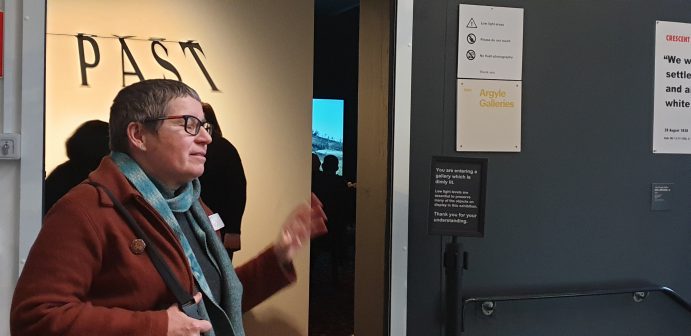…by Francesca Beddie
Whatever comes the way of the professional historian it’s important to stick to your principles. This was a recurring message during a forum, Challenging Histories, organised by PHA Victoria and Tasmania and held on 27 July at the Tasmanian Museum and Art Gallery in Hobart.
The event was made particularly special by Julie Gough, the renowned Tasmanian artist who showed conference goers through her exhibition, Tense Past, after having introduced the forum with a welcome to country and staying to listen to all the presentations.
I found myself kicking off the proceedings with a pared-back presentation I’d made in New Zealand about the need for multicultural histories to enter the official narrative. I encouraged professional historians to use their links to communities to make more visible the diversity of Australian histories being uncovered. I cited as an example the Chinese Anzacs project, which has identified 213 Chinese-Australian serviceman who served in WWI, and aimed to encourage Chinese Australians to discuss the stories of their forbears.
For Rebecca Carland (PHA Vic and Tas) the job of bringing to light a 1929 collection of photographs, cultural objects and detailed notes on the Yaghan people of Tierra del Fuego has required confronting political, institutional and environmental challenges to restore their heritage to an isolated and marginalised community. (If you are in Melbourne on 21 August, you can hear more about this important initiative: https://museumsvictoria.com.au/melbournemuseum/whats-on/lost-in-translation/)
In the case Helen Munt (PHA WA) discussed, the challenge was to disentangle the facts from long-held community beliefs in Albany. This entailed a painstaking examination not only of written records but also maps and paintings. Having established where Major Lockyer actually raised the Union Jack on January 1827, thus claiming Albany for Britain, the next challenge will be to design a bicentenary that recognises the full import of the arrival of the colonists in Western Australia.
Michelle Richmond, PHA (NSW & ACT) showed us what meticulous work was required to undertake a heritage assessment on the first official Aboriginal land grant in Australia. She took us to the original Blacktown settlement on the Richmond Road, revealing the language used to describe Aboriginal people in the documents (blacks, hence Blacktown; natives) and the ways in which Governor Macquarie and others attempted to educate and ‘civilise’ Aboriginal children. Another Michelle, Michelle Blake who loves land title searches (and has recently moved from Hobart to Sydney), also addressed the challenges of archival work when a subject lived outside the date range of available sources.
Historians must stand up to the marketers. Helen Penrose, PHA (Vic & Tas) discussed the ways in which this can be done: by establishing the historian’s remit and sticking to it; making clear the differences of a historical account and promotional document; sometimes through negotiation; and in the worst of cases by walking away.
Alan Davis, PHA (NT), gave an account of the life of a reference librarian in the Northern Territory, having to respond to vaguely posed queries about the Territory’s history, which remains scantly documented. He pointed to the resources that were available: the NT Dictionary of Biography and now reliable access to online sources, saying these had improved the chances of being able to uncover answers to visitors’ questions. Lucy Bracey, PHA (Vic & Tas), also talked about how technology is changing the way historians who do not live in cities can operate, for example by using better scanning apps such as Camscanner when they are in the archives and communicating with colleagues and clients with ever-improving video conferencing tools like Zoom.
The last speaker, Sue Graham-Taylor PHA (WA), offered thoughtful and funny reflections on her career (see her profile in Historia). When the audience was not laughing hard at her anecdotes, they were getting very useful advice about the importance of both connecting with community as well as incorporating historical perspectives into policymaking, being principled and tactful; keeping a sense of humour; and sometimes saying enough is enough.
Then came the tour de force. Julie Gough’s Tense Past is a masterpiece of combining the historical record (or lack thereof) and artefacts with exquisite artistic practice to revive the voices and culture of Tasmanian Aboriginal people and to make us mourn all the missing children.
With many thanks to Jill Barnard for all the work involved in organising the event.
Caption: Julie Gough at the start of our tour

Great report Francesca, thanks for representing (with Michelle) the NSW & ACT
Thanks Mark. It was a good meeting too.
Yes Great report Francesca. Your report represented well, the great regional forum we had.